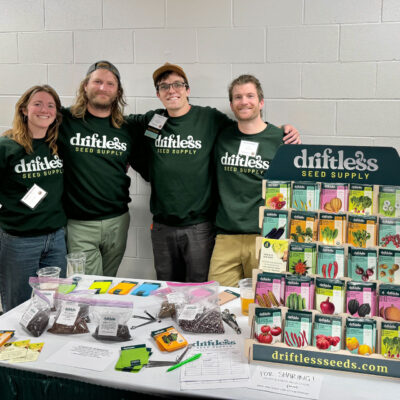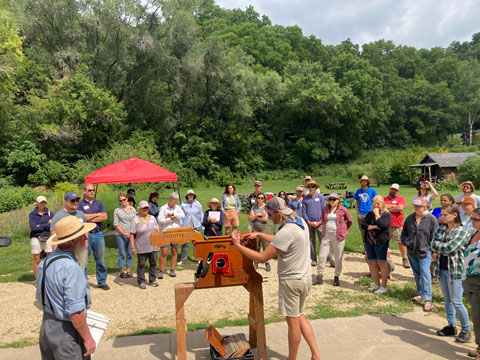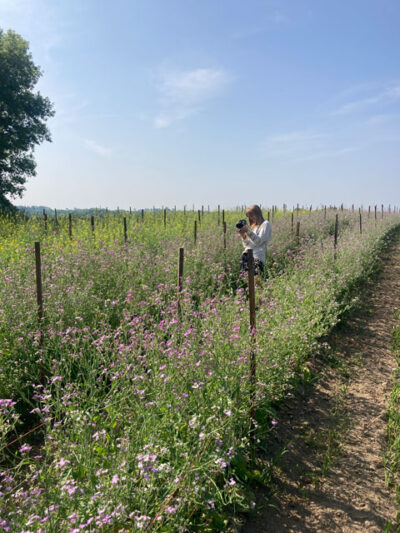success story
Forming a co-op for seeds
Driftless Seed Supply aims to give Midwest growers locally produced crop seeds
 Farmers form cooperatives to buy and market products such as milk and grains, so why not band together to form a co-op for another basic farm necessity—seeds? Specifically, seeds for growers in the Midwest.
Farmers form cooperatives to buy and market products such as milk and grains, so why not band together to form a co-op for another basic farm necessity—seeds? Specifically, seeds for growers in the Midwest.
That’s what Dylan Bruce and Cody Egan were thinking when they founded Driftless Seed Supply in 2023.
Bruce, who grew up on a farm, is a former University of Wisconsin-Madison vegetable researcher with a master’s degree in agroecology. His wife, Anna Skye Bruce, earned a doctoral degree in entomology from UW-Madison. The couple made their home in the Driftless area and established a vegetable and flower farm, Circadian Organics, in Ferryville in 2018, with a focus on sustainable production methods that minimize waste.
As their crop production grew and provided community-supported agriculture (CSA) shares to as many as 100 members, the couple began a side business producing seeds for regional companies.
Egan, of Mabel, Minnesota, had been managing the seed catalog production at Seed Savers Exchange, a bank of about 20,000 heirloom and biodiverse seeds available for growers nationwide to swap. Circadian Organics was one of the contract seed producers; that’s how Bruce and Egan met. Egan later started his own contract seed production farm.
Bruce and Egan realized that a seed production organization for Midwest farmers, with high-quality seeds that bear up to Midwest growing conditions, could be beneficial—especially if it were a collaborative effort. So they formed a separate company, Driftless Seed Supply.
Gauging co-op prospects
 Negotiating to buy seeds is an “opaque market,” Bruce says. Farmers often don’t know where the seed they purchase has been grown or produced, and individual farmers may be getting less favorable prices than larger operations.
Negotiating to buy seeds is an “opaque market,” Bruce says. Farmers often don’t know where the seed they purchase has been grown or produced, and individual farmers may be getting less favorable prices than larger operations.
Collective power would let seed growers share knowledge and achieve economies of scale, he says: “Cooperative model governance resonates with us a lot in terms of shared decision-making, shared benefits and responsibilities, and shared risks.” Growers would be able to focus on the types of crops they like to grow, and on a larger scale, Bruce says—and they could draw higher prices for their products.
A $24,000 grant from WEDC is helping Driftless Seed Supply determine if it’s feasible to turn the company into a cooperative. “We wouldn’t have been able to afford to pay for consultants on cooperative businesses without the grant,” Bruce says. “The UW Center for Cooperatives is helpful, but hired consultants have the depth of experience and the time to talk to other growers. With our own farm and our seed business, I don’t have the time or bandwidth to convene growers.” The feasibility study will also provide a sales and market analysis that will project costs, benefits, and target markets.
A final report is due in late summer, and Bruce and Egan have been perusing initial data and getting prepared. “We have bylaws and articles of incorporation ready to go,” Bruce says. A steering committee is currently composed of members from Wisconsin, Michigan, and Iowa. “We’ve already tripled the grower base that we’re working with.”
WEDC’s Cooperative Development Grant Program was created to support the development of new and existing co-ops in Wisconsin, with a goal of fostering those co-ops’ success by supporting planning and exploratory research in advance of making a large investment.
Collective power
 Driftless Seed Supply already sells its seeds in locations around Wisconsin, Minnesota, and Iowa and hopes to expand its reach, primarily in grocery co-ops, independent grocery stores, hardware stores, and independent nurseries and garden centers.
Driftless Seed Supply already sells its seeds in locations around Wisconsin, Minnesota, and Iowa and hopes to expand its reach, primarily in grocery co-ops, independent grocery stores, hardware stores, and independent nurseries and garden centers.
Bruce’s favorite crops to grow are vegetables in the squash family, peppers, and tomatoes—crops with deep indigenous roots in America—and radishes. “The delicate little spring radishes we are used to eating turn into big, beautiful, wild-looking hedges covered with white and pink flowers,” he says.
A cooperative focusing on seeds that cater to Midwest farmers would go a long way toward making the seed industry more transparent and more localized, Bruce says.
“As Midwest seed producers, we’re a small bunch compared to other regions. Whether it’s negotiating for contracts or going directly to the market, we’re competing for the same small pieces of pie,” he says. “If we work together, Midwest seed growers can more effectively compete with larger companies from other regions.
“Elevating our region’s seed growers will help farmers, gardeners, and chefs really understand that seed is the core foundation of our food system,” he adds, “and that it’s important to buy local seed. There will be more cooperation and more collaboration among growers.”
Says Bruce: “Agriculture is a very individual situation. We do a lot better when we cooperate.”
Visit the Cooperative Development Grant Program webpage to learn more about the program.
“Elevating our region’s seed growers will help farmers, gardeners, and chefs really understand that seed is the core foundation of our food system and that it’s important to buy local seed.”



